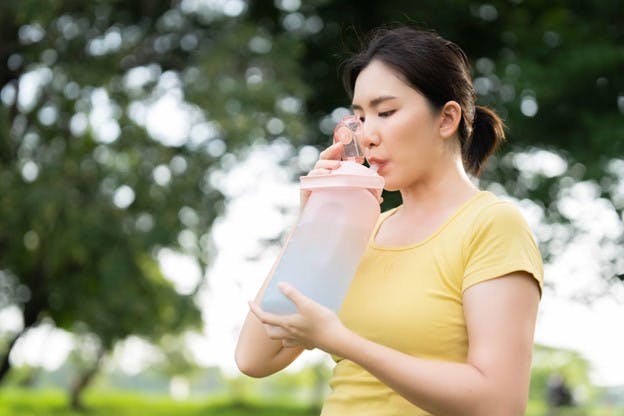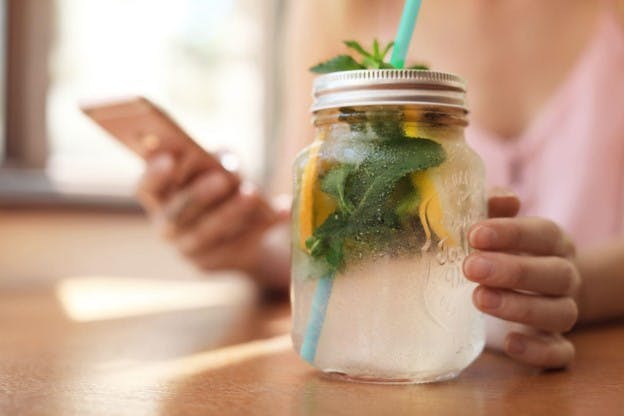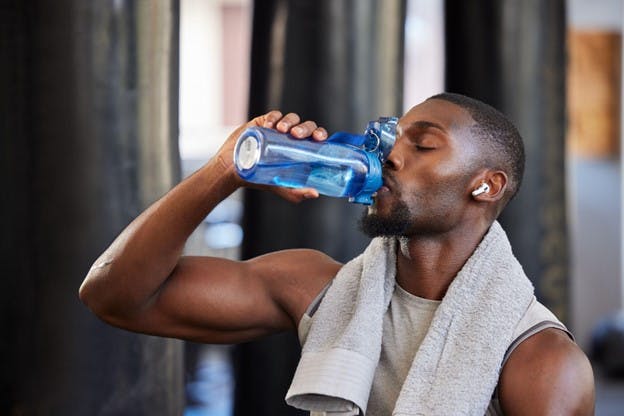🌟 New Arrival! Upgrade Your Water with Our Advanced Pitcher Filter. Shop Now
September 2023
Are Healthy Kidneys and Water Quality Linked?
Most of us don’t drink enough water. We know we’re supposed to drink more, but we’re busy, bottled water is expensive, and our tap water may taste a little funky. Still, we know we should be doing better because water is vital for our health.
But what does it mean to say water is vital to our health? Besides the fact we wouldn’t make it more than 3-4 days without fluid intake, there’s not a single function in our bodies that doesn’t rely on water in some way. That’s not an exaggeration — even our bones are made up of 31% water.
When we are even a little bit dehydrated, nutrients don’t travel to where they need to, and organs don’t function optimally. It’s thought that severe or even chronic mild dehydration can damage our kidneys. But is it true?
In this article, we’re going to take a deep dive into how kidneys and water interact. We’re going to look at both the amount of water doctors believe we should be drinking for kidney health and take a look at the relationship between kidney problems and water quality.
Why Do You Need to Drink Water?
You may have heard that your body is made up of about 60% water. What you may not know is that you’re constantly losing water. You may believe you only lose water when you sweat heavily or take a trip to the bathroom, but if you’ve ever exhaled onto a mirror, you know you’re losing water with every breath.
On top of that, you sweat nonstop. Your body is always working to regulate its temperature and one of the mechanisms it uses for this balancing act is to sweat. Sometimes that’s very easy to notice. But even when sweat isn’t beading, something called insensible sweating is happening. This is a small amount of sweat that evaporates off of you before you even notice it.
Insensible fluid loss can account for several quarts of water loss per day that need to be replaced. If you add a workout to that it can be far more.
Water consumption is important because even being dehydrated by just 2% is enough to experience significant cognitive and motor control impairment. It’s a good thing to remember when you’re having an off day. Reaching for a glass of water might do you better than another coffee.
What Do Kidneys Do?
Kidneys filter out waste products and fluids from your blood and send it out as urine. Together your kidneys cleanse about 200 quarts of blood per day and create a urine volume of roughly 2 quarts per day.
Beyond being a filter, your kidneys are also an endocrine organ. This means they produce hormones that help other organs to work. Through releasing hormones, kidneys play a part in regulating your blood pressure. They also regulate electrolytes like potassium and sodium. Kidneys produce vitamin D and help your body metabolize calcium. They even help control the production of red blood cells.
How Do Kidneys and Water Interact?
Hydration is crucial for kidney health and function. Kidneys use water to filter out waste. Without enough water, a kidney can’t do its job and you’ll have a build-up of toxins in your blood. People with kidney failure often go through dialysis to clean their blood.
If your kidneys don’t have enough water, you can also be at risk for urinary tract infections and kidney stones. Both of these can cause kidney damage. Water also helps your body move blood, oxygen, and nutrients to where it needs to go. Like everything else in your body, your kidneys need to be nourished.
Does Drinking a Lot of Water Affect Kidney Function?
When it comes to kidneys and water, drinking adequate water to stay properly hydrated allows your kidneys to work properly. Water isn’t the only factor in your kidney function, but if you don’t have enough, the likelihood of keeping your kidneys healthy and functioning goes down.
There is a limit to how an increased water intake would benefit you though. If you drink more than you need, your kidneys will just excrete it as urine in an attempt to balance your water and electrolyte levels. Keeping the proper sodium concentration in your blood is essential to good health. Too much water can dilute it. Luckily your kidneys are smart, and they’ll send any water they don’t need straight to your bladder.
What Are the Symptoms of Low Kidney Function?
In early stages of chronic kidney disease (CKD), you may not notice anything. Your body is very good at adapting to some function loss. It helps that we have two kidneys. Often, the only way you’ll know is if you happen to get your blood or urine tested in a routine check up.
Once it advances to kidney failure, also known as renal disease, the symptoms can stack up. A few common ones are:
- Headaches
- Weight loss/no appetite
- Trouble breathing
- Blood in your urine
- Sluggishness
- Peeing more
- Insomnia
- Swelling and water retention
- Muscle cramps
- Itchy skin
- Erectile dysfunction
How Does Water Quality Impact Your Kidneys?
Kidneys act as a blood filter for your body. That means many toxins you may ingest will likely find their way into your kidneys at some point. Once there, they become risk factors for kidney issues.
Some common examples of kidney and water contaminants known to lead to CKD or even cancer are:
- Lead and other heavy metals can be found naturally in the environment where your drinking water comes from or from your plumbing. Best known as a neurotoxin that will stunt the cognitive and physical development of children, it’s also dangerous for kidneys.
- Trihalomethanes (TTHMs) are known as disinfection byproducts. They form when disinfection chemicals like chlorine and chloramines interact with organic matter in the water. Since chemical disinfectants are so common in the U.S. and Canada, these disinfection byproducts are also very common. They’ve also been linked to kidney damage amongst other problems.
- PFAS are known as forever chemicals because they don’t break down in the environment or your blood. They’ve been heavily used in products like Teflon pans for their nonstick qualities since the 1950s. As a result, they are found in water supplies across the world. Many public water suppliers, like in Tucson, Arizona, are dealing with levels of PFAS that are so high, they have closed treatment plants. There are a variety of ways PFAS are a healthcare problem. One of them is an increased risk for kidney cancer.
- Hard water minerals like calcium and magnesium can wreak havoc on your pipes, surfaces, clothes, and appliances. Unfortunately, they can also cause kidney issues when consumed over a long period of time. In the United States, almost 90% of cities have issues with hard water. The only way to remove it is with a water softener or a salt-free water conditioner.
What Is the Best Thing to Drink for Your Kidneys?
The best thing to drink for kidney health is just plain water that’s been filtered. Filtered water hydrates you without the added sugars or chemicals. While water is widely considered the best choice, it doesn’t have to be your only choice. Many kidney experts note that you can drink coffee, green tea, and even some fruit and vegetable juices to help your kidneys out.
How Much Water Should I Drink for Kidney Health?
If your kidneys are pretty healthy, a popular recommendation is eight glasses of water per day. While this is fine for most people, it’s generic advice that doesn’t take into account your activity levels, the climate you live in, your body mass, or the rest of your diet.
Still, most of us don’t need to get that nuanced. One way to improve on the 8 glasses of water recommendation without overwhelming yourself is to halve your weight in pounds and then drink that many ounces of water each day. For example, if you weigh 200 pounds, divide that by 2 to get 100 ounces of water per day (which would actually be 12 glasses per day, not 8!).
If your kidneys are not healthy, the answer to this question might be very different. Someone on dialysis for instance may have to severely limit their water intake. Also, pregnancy and breastfeeding can mean you need even more water. It's important that you talk to your doctor before making any decisions regarding your kidneys and water.
How Can I Get My Kidneys Healthy Again?
If you believe you have poor kidney health, your best bet is to see your doctor or a nephrologist. Many of the CKD symptoms are common to other health issues. Seeing a doctor can let you know for sure what’s happening.
There may be many options for improving kidney health and quality of life like dietary changes, exercise, medications, or medical procedures. In severe cases, that could mean dialysis or even a kidney transplant. Getting checked out early if you have symptoms could decrease your chance of it becoming worse.
Keep Your Kidneys Happy and Hydrated
Kidneys help keep your blood clean and moving. But kidneys can’t do it on their own. Like every other organ in your body, kidneys and water are a team. If kidneys don’t get enough water, they can’t do their job of flushing out toxins. But if your water is filled with contaminants, you might not be doing your kidneys any favors.
If you want the best water quality possible, HomeWater can help. Our American-made UPSTREAM™ 4-Stage Whole Home Water Filter uses multiple filtering technologies to reduce particulates, heavy metals, chlorine, VOCs, PFOS/PFAS, and disinfection byproducts from every faucet in your home. Add on a HomeWater Salt-Free Water Conditioner and take care of your hard water problems too.
Not sure which water filtration system is right for you? Take out Filter Quiz and have all your questions answered in minutes.


